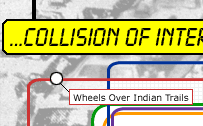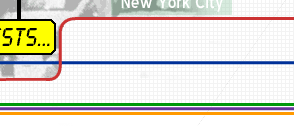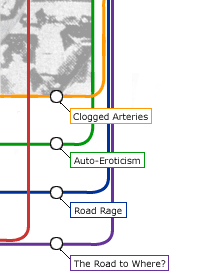



The Social Ideology of the Motorcar || How Traffic Destroys the Eco-City || Killed by automobile || Excess
Situationist Theses on Traffic
by Guy Debord
Internationale Situationiste #3 Decmber 1959
1- The mistake made by all urbanists is to consider the automobile (and its by-products like the motorcycle) essentially as a means of transportation. Such a misconception is a major expression of a notion of happiness that developed capitalism tends to throughout society. The automobile is the centerpiece of this general propaganda, both as sovereign good of an alienated life and as essential product of the capitalist market: This year we hear that American economic prosperity is soon going to depend on the success of the slogan "Two cars per family."
2- Commuting time, as Le Corbusier rightly pointed out, is additional labor which correspondingly reduces the amount of so-called free-time.
3- We must replace travel as an adjunct to work with travel as pleasure.
4- To want to redesign architecture to suit the needs of the present massive , parasitic existence of private automobiles reflects the most unrealistic misapprehension of where the real problems lie. It is necessary to transform architecture in accord with the whole development of society, criticizing all the transitory values linked to condemned forms of social relationships (in the first place the family).
5- Even if, during a transitional period, we temporarily accept a rigid division between zones of work and residence, we should at least envisage a third sphere: that of life itself (the sphere of freedom, of leisure - the truth of life). Unitary urbanism acknowledges no boundaries; it aims to form a unitary human milieu in which separations such as work/leisure or public/private will finally be dissolved. But before this, the minimum action of unitary urbanism is to extend the terrain of play to all desirable constructions. This terrain will be at the level of complexity of an old city.
6- It is not a question of combating the automobile as an evil in itself. It is its extreme concentration in the cities that has led to the negation of its role. Urbanism should certainly not ignore the automobile, but even less should it accept it as its central theme. It should reckon on its gradual phasing out. In any case one may anticipate that the central areas of certain new complexes, as well as of a few old cities, will become closed to automobile traffic.
7- Those who believe that the automobile is eternal are not thinking, even from a strictly technological standpoint, of other future forms of transportation. For example, certain models of one-man helicopters presently being tested by the US Army will probably spread to the general public within twenty years.
8- The breaking up of the dialectic of the human milieu in favor of automobiles (the projected freeways in Paris will entail the demolition of thousands of houses and apartments although the housing crisis is continually growing worse) masks its irrationality under pseudopractical justifications, But it is practically necessary only in terms of a specific social set-up. Those who believe that the particulars of the problem are permanent want in fact to believe in the permanence of the present society.
9- Revolutionary urbanists will not limit their concern to the circulation of things and of human beings trapped in a world of things. They will try to break those topological chains, paving the way with their experiments for a human journey through authentic life.
If we add up the time-space-machine-energy cost of forced driving (at the exclusion of pleasure driving), we reach the inescapable conclusion that we must be mad. Something like 1/6 of our "gross national civilization" is given to the single, elementary, secondary task of delivering ourselves where we need or want to be. A topsy-turvy kind of culture. Worse yet is the life negation constructed by suburbia, the ultra- segregation habitat. The social and cultural costs are indeed rebounding everywhere and on everyone.
The project reinstates the pedestrian (biped) as the undisputed numero uno. This is one "novelty" in complexity-miniaturization that speaks clearly of effectiveness, immediacy, frugality, coherence, purpose, variety, and ecological-human responsibility (and in one single stroke, close to a 20% saving in energy consumption)! the much heralded information-communication revolution will only alleviate some of the commuting waste while favoring the onset of an even more pernicious dogma of segregation.
Back to top